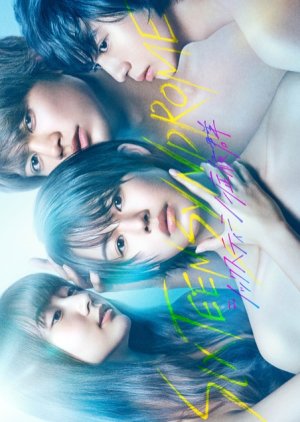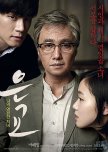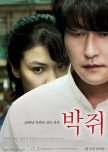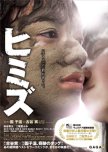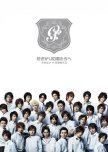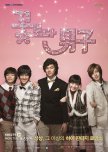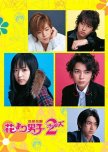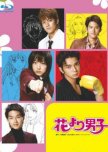
Asuma Ibuki and Otazawa Mei are Mutsumi's classmates. They've been best friends since childhood, with the tomboyish Ibuki always at Mei's side as her constant protector and savior. Mei is shy to the point of being almost incapable of interacting with anyone else, so the two of them focus solely on each other, rarely allowing anyone else into their circle.
With Mei being so fearful of other people, Mutsumi at first sees her as his ultimate challenge, but as soon as he starts in with his usual tactics to win her over Ibuki realizes what he's up to and fiercely shuts him down.
This leads the undaunted Mutsumi to start thinking that Ibuki herself would be an even more challenging conquest than Mei. He makes a bet with two of his friends that he can make Ibuki fall in love with him, and from there the game begins.
A compelling addition to the series are occasional "self confessional" videos where individual characters sit alone and reveal their private thoughts and feelings. These segments are filmed in portrait mode as though recorded with a mobile phone, adding to their sense of immediacy and rawness. It is here that we learn how troubled Mutsumi really is, and Mei as well. In Mutsumi's case these sessions expand upon his character and make him more sympathetic, and it's through them that we learn that the feelings he's showing toward Ibuki have become real for him.
Ibuki is the most central character to the series, since the other three -- Mei, Mutsumi, and a younger student named Sakurai Nao (introduced about midway through the series) -- are much defined by the ways in which Ibuki has awakened a need in each for a deeper connection with her.
Performances are superb all around.
Itagaki Mizuki impressively navigates the many sides of Mutsumi's character, making us gradually understand why he's become so guarded and hostile, and eventually making us want the best for him. With Ibuki's encouragement Mutsumi gathers the courage to let others -- including his estranged mother -- know the real him, and it's endearing to see how much wonder he feels over Ibuki's sincere concern for his emotional well-being.
Takeda Rena as Mei fully embodies that character's vulnerability, and we cheer her on when she finally attempts to expand her world beyond Ibuki, one tiny step at a time.
Rounding out the main cast, Goto Yutaro makes a perfect Nao, androgynously beautiful and fearless in his own way, not hesitating to make his feelings known to Ibuki as soon as he realizes them.
'Sixteen Shoukougun' ('Sixteen Syndrome') is much more than a high school romance. Its complex characters will stay with you long after it has ended, and if you're like me you'll be returning to it again to pick up on what you might have missed before.
Was this review helpful to you?

Sweet little 16...
I really liked this J-drama. The story was short but surprisingly intense about 4 high school freshmen who are taking their first steps to adulthood and the changes necessary for that to happen. All 4 of the leads are suffering from one type of trauma or another. One (Mei) is almost OCD when it comes to her relationship with her one and only friend, Ibuki, the female 1st lead. She's so jealous of her that some other students think they're a couple.It was refreshing to see a female lead who was tom-boyish and comfortable in her skin. I loved the fact that she doesn't change herself (style or confidence-wise) you could see why everyone wanted to be around her. I also loved how she navigated all the love letters and confessions she got from both sexes.
I scored it an 8. I would have scored it higher but the ending is abrupt, to say the least.
Bottom Line: If you are looking for a short drama to watch on the bus or between classes this is a good one.
Was this review helpful to you?

This drama tells a very complicated story briskly in eight small episodes. Although it focuses on a toxic friendship, it also apprise a cute love story of a playboy and a tomboy. If not a fancy romance, I can still promise you many warm back hugs.
When you watch it, the flaws shine brighter than the unique storyline, but I think if you pick a short drama then it's mandatory that you won't get any background details in depth or full length development of the characters. Right? Because I saw many comments regarding the rushed ending and I agree with them, but I also can't think of anything better in just 20 minutes.
So this story deals with mental health without a Physcatrist till the end. If you are sensitive to issues like suicide/ unhealthy obsession, then skip it.
But if you want to take break from your daily lovey dovey/ academic high school drama then it's definitely a good choice.
Ps: I completed it in one sitting :) happy drama watching ❤
Was this review helpful to you?

This review may contain spoilers
My Friends are the Center of the World, My Parents Come from Another Planet
Although I am busy writing articles reviewing dramas, but Sixteen Shoukougun has been at the back of my mind to write review about. So I'm the 3rd reviewer for this little gem. It's my favorite high school drama for 2020, and I don't usually want to watch this sub-genre. The story centers around the close-knit relationship between two girls, Ibuki and Mei, who have known each other since they were kids. So tight that they won't allow other people come in between them, that the kids at school dubbed them as the Prince (Ibuki) and the Princess (Mei). Until one day, the notorious school playboy Mutsumi, enters their small world.I will leave the story above like that, you should watch the rest: what happened to the three of them? Just treat it like the synopsis (without spoiler), since the current synopsis sucks. It doesn't tell you the quality of this drama.
Why I recommend it?
1. It's short, 8 episodes 20 minutes each. Perfect for binge-watching and re-watching.
2. Though short, it portrays a good character and relationship developments. I'm amazed the growth can be adequately seen in such a short drama!
3. Acting of actresses Takeuchi Aisa, as the tomboy Ibuki, and Takeda Reina, as the pretty yet fragile Mei, nailed their respective characters. I have seen them in other dramas. Acting of the main actors were just fine.
4. The drama really shows the struggle experienced by teenagers. I like their reflective in forms of cellphone recordings. I 100%-ly recommend to be watched by teenagers.
5. The dialogues are pretty good. Wisdom and advises came from the mouth of our young characters.
6. No unnecessary side stories or supporting characters. You'll be surprised almost the whole drama the story just centered around Ibuki, Mei, Mutsumi, and Nao
My only complaints:
1. Actor Itagaki Mizuki looks too old as a 16 year old boy. No complaint on his acting, but I wish the production team cast a younger looking actor instead
2. I wish Nao comes into the scene earlier. His character is uniquely interesting. They should make him more ambiguous, somewhat stalkerish, with deep unrequited love. But since this drama is adapted from manga, we're just have to be satisfied with the original plot.
Oh, regarding the title. Someone in comment section questioned about the absence of parents of these kids (unless when flashback to the past). Though they experience tough times to the point of being hospitalized, no parent is seen in the scene. Oh yeah, also not any teacher role. I think this drama is definitely intended for teenage viewers. As when I was at their age, my school friends were the center of my world. And I had a youth sentiment that our parents didn't know anything about us. And I'm still have that understanding, though at my age now I can be their parents.
Was this review helpful to you?
This review may contain spoilers
Worth watching
It's only 8 short episodes but the story was portrayed so well I watched it all in one sitting. It shows 4 characters with a tomboyish girl as the central character. I really love her androgynous get up. It's not just her outer appearance that attracts both sexes to her, the other three characters were drawn to her like a moth due to her personality.One way or another you see her changing and influencing those around her- her friend that is quite obsessed with her, a playboy and a boy who is slightly feminine. however, at the same time, you see that she is also human.
The only reason why I gave it 8 in the storyline is that it was too short and we don't get to see how close the four of them bond together.
But overall if you're looking for a non-typical school drama that is very short, this is the one for you
Was this review helpful to you?

This review may contain spoilers
This is a short drama, but it does pack an emotional punch. All four characters have personal issues, past traumas, and are trying to deal with them while being adolescent still. It’s all the painful and heartbreaking path to growing up. Mei, even before her kidnapping ordeal, is obviously a child with obsessive-compulsive disorder. She needs psychiatric help. I believe with Ibuki protecting her only makes Mei’s OCD worse. Since it is such a short drama, the ending seems too abrupt and tied-with-a-bow closure for the four friends, especially with all the psychological issues these main characters are facing (i.e., OCD, child molestation, kidnapping, guilt, abandonment, bullying, body-shaming). Some of these issues are alluded to, but never fully explored in the drama. I enjoy seeing Asada’s love for Ibuki grew from a self-centered love to one of understanding and sacrifice: You can continue to protect Mei; I will in turn protect you. I love how he never asks Ibuki to choose between him and Mei; he just wants to part of Ibuki’s life. Was this review helpful to you?

Friendship × Romance
I'm not a fan of youth, high school, teen romance. But Sixteen Syndrome carries more than the classic high school romance trope. As the story flows, romance does not matter as much as the dynamic of the characters' friendship.I personally think it is a well-written teen drama. A pack of minimal angst of youths' emotions is well served in just 8 episodes. I wish they were longer and more developed with their parents and peers. It has the vibe which a South Korea screenwriter would choose to write a more depth elaboration (read : a remake).
The characters are amazing. I enjoy the growth of Mei and Ibuki. Asada has been great tho I could put less care on the romance between him and Ibuki. I wish (again) we can see more on Sakurai. I love their interaction as friends. It is wholesome to see 4 of them on screen.
I like the sounds too. The opening was great and closing felt very underground and dark.
Overall, I enjoy the friendship and growth of youth themes carried by Sixteen Syndrome. It is short yet meaningful. It has the potential to be a complete well elaborated drama but this is jdrama anyway; organized and packed with important scenes.
Was this review helpful to you?

Identity theory
Everything is fine with lesbians or gays; it's natural and people are born with their own identity or develop one. However, when a character says, "I am neither a girl nor a boy, and it doesn't matter anyway," it borders on a fascist script for engineering consciousness. She could have said, "I don't feel sure about being a girl, I don't feel feminine, I don't like being feminine, and maybe I'm also attracted to women," but the end of her sentence, "I am neither this nor that, so it doesn't matter," already proves there is fascist intervention.A human girl with clear, realistic boundaries, especially in conservative Japan, would never say or even think such a thing. There are quite a few Japanese films with identity issues; that's fine, but this trifle of identity theory and this obsession has nothing to do with conservative Japan that cherishes femininity and family values.
It's clear that this production is aimed primarily at the Western audience in the United States. Even the way they talk in the videos, as if speaking to themselves, feels forced. Instead of speaking to someone, a friend, a parent, or in front of a mirror, we watch a scene where characters are displayed like in a mobile, squeezed into a technological cube, as if they are broadcasting their feelings on TikTok. They lack personality and thoughts of their own, even a human space. What matters to the director or writers is to please the viewers, not to show a human perspective outside the box.
Was this review helpful to you?

